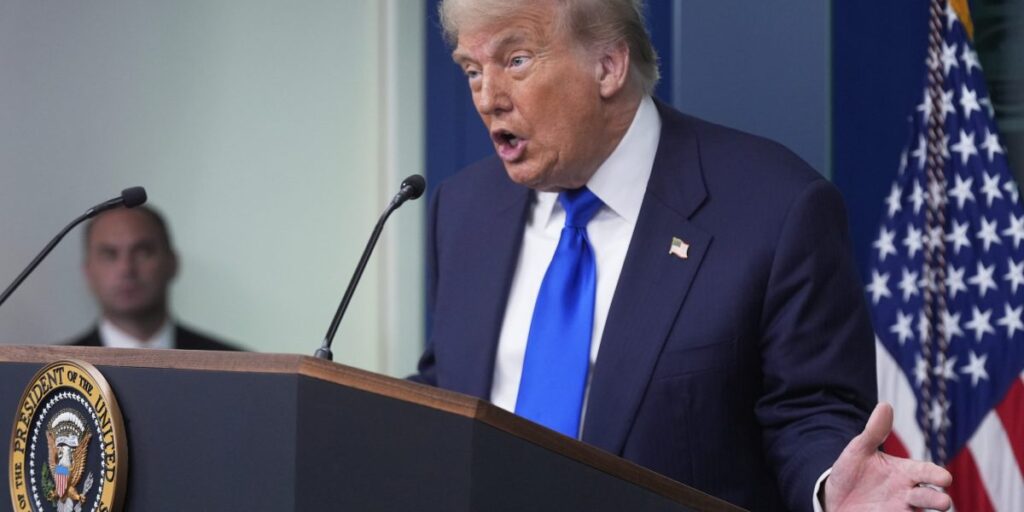
President Donald Trump announced on Friday the suspension of trade negotiations with Canada, citing the country’s decision to proceed with a digital services tax on technology firms as a “direct and blatant attack on our country.” The tax, which affects both Canadian and foreign businesses engaging with online users in Canada, is set to take effect on Monday.
In a post on his social media platform, Trump declared, “Based on this egregious Tax, we are hereby terminating ALL discussions on Trade with Canada, effective immediately. We will let Canada know the Tariff that they will be paying to do business with the United States of America within the next seven day period.”
This announcement marks the latest turn in the tumultuous trade relationship between the U.S. and Canada since Trump assumed office for a second term in January. The U.S. president has frequently critiqued Canada, even suggesting its potential absorption as a U.S. state. Canadian Prime Minister Mark Carney responded by emphasizing Canada’s commitment to negotiating in the best interests of its citizens.
Impact of the Digital Services Tax
The digital services tax will impose a 3% levy on revenue from Canadian users on major companies such as Amazon, Google, Meta, Uber, and Airbnb. The tax applies retroactively, resulting in a $2 billion bill for U.S. companies by the end of the month. Industry leaders have expressed concern over the tax’s implications.
“We appreciate the Administration’s decisive response to Canada’s discriminatory tax on U.S. digital exports,” said Matt Schruers, chief executive of the Computer & Communications Industry Association.
Trump’s administration has been negotiating with Canada to ease tariffs previously imposed on various goods. However, the digital services tax has become a significant point of contention, complicating trade discussions further.
Broader Trade Tensions
Trump’s trade policies have been characterized by high tariffs on imports, including a 50% tariff on steel and aluminum and a 25% tariff on autos. Additionally, a 10% tax is levied on imports from most countries, with potential increases looming if negotiations fail to yield results by July 9.
Canada and Mexico face distinct tariffs of up to 25%, ostensibly to curb fentanyl smuggling, although some products remain protected under the 2020 U.S.-Mexico-Canada Agreement from Trump’s first term.
Following a private meeting with Republican senators, Treasury Secretary Scott Bessent declined to comment on the suspension of trade talks with Canada, stating, “I was in the meeting,” before moving on to other questions.
Economic Interdependence
The economic ties between the U.S. and Canada are substantial, with about 60% of U.S. crude oil imports and 85% of electricity imports originating from Canada. Furthermore, Canada is the largest foreign supplier of steel, aluminum, and uranium to the U.S., and holds 34 critical minerals and metals sought by the Pentagon.
Approximately 80% of Canadian exports are destined for the U.S., highlighting the significant economic interdependence between the two nations.
“The Digital Services Tax Act was signed into law a year ago so the advent of this new tax has been known for a long time,” said Daniel Beland, a political science professor at McGill University in Montreal. “Yet, President Trump waited just before its implementation to create drama over it in the context of ongoing and highly uncertain trade negotiations between the two countries.”
Looking Ahead
As tensions escalate, the future of U.S.-Canada trade relations remains uncertain. While Trump has suggested that Canada could remove the tax to restart negotiations, Prime Minister Carney has maintained a firm stance on the issue. The coming days will be crucial as both nations navigate this complex economic landscape.
The implications of these developments extend beyond immediate economic impacts, potentially reshaping the broader geopolitical dynamics in North America. Stakeholders on both sides of the border are closely monitoring the situation, anticipating potential shifts in policy and strategy.
As the deadline for the digital services tax approaches, all eyes are on the U.S. and Canada to see if a resolution can be reached or if the impasse will deepen further.







